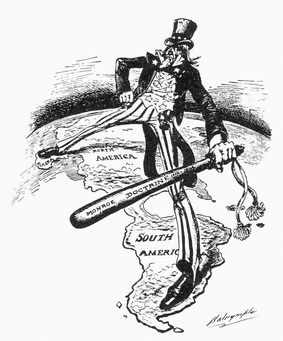Monroe Doctrine
|
The Monroe Doctrine was outlined in a few paragraphs of President James Monroe's seventh annual message to Congress on December 2, 1823.
It was developed because the United States and Britain were concerned over the possibility of European colonial expansion in the Americas. Britain feared that Spain would attempt to reclaim its former colonies, which had recently gained independence. This would have caused Britain's trade with these new nations to decline. The United States wanted to ensure that no European nations would attempt further colonialization in the western hemisphere. The Monroe Doctrine became a cornerstone of future U.S. foreign policy. You can read a transcript of the relevant parts of his message by clicking here. |
The Roosevelt Corollary
In his 1904 address to Congress, Roosevelt declared that the Monroe Doctrine compelled the U.S. to be an international police force. Basically, the United States would use its military to keep the Europeans out, and keep the rest of the Americas in line.
Whereas the Monroe Doctrine had been mere words, the Roosevelt Corollary was backed by the might of a new and improved U.S. Navy. It was responsible for the deployment of American troops at least 35 times throughout the 20th century to preserve national interests throughout Latin America and the Caribbean. It was truly the embodiment of President Roosevelt's philosophy, 'Speak Softly, and Carry a Big Stick.'
Whereas the Monroe Doctrine had been mere words, the Roosevelt Corollary was backed by the might of a new and improved U.S. Navy. It was responsible for the deployment of American troops at least 35 times throughout the 20th century to preserve national interests throughout Latin America and the Caribbean. It was truly the embodiment of President Roosevelt's philosophy, 'Speak Softly, and Carry a Big Stick.'
